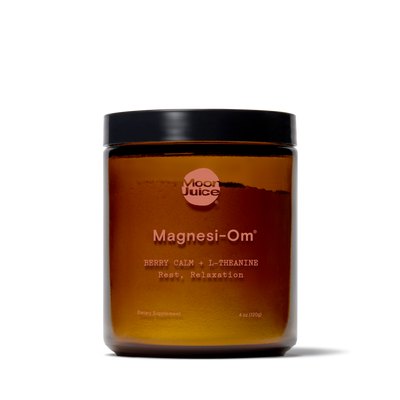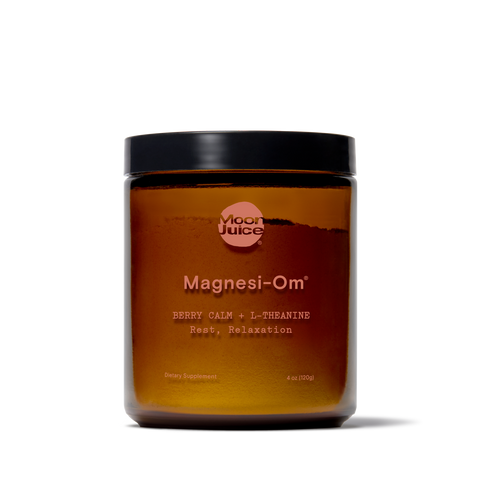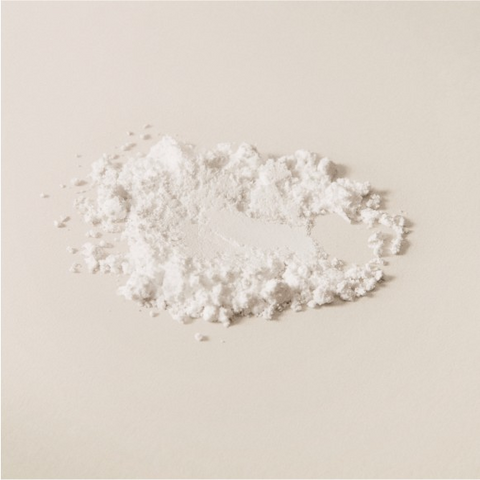Magnesium might not be the first thing you reach for in your skin care regimen, but it turns out this mineral plays an unexpected role in skin health. Responsible for over 300 enzymatic processes throughout your body from DNA repair to cell regeneration, this essential nutrient is necessary for overall health, including visible markers like your skin. Read on to find out all about Magnesium benefits for skin.
Is Magnesium Good for Skin?
Magnesium is an all-body MVP, and the benefits of Magnesium extend to the appearance of our largest organ: our skin. Its skin-protective properties include aiding in cell repair, helping skin maintain moisture, and fighting the effects of cortisol. Magnesium supplements are often used for their calming effect on skin, while on a cellular level, it has the potential to support regeneration and rejuvenation.
What Does Magnesium Do for Your Skin?
There are many ways that Magnesium can impact your skin health from the inside out and the outside in. Optimal Magnesium intake can help support hydration and barrier function in your skin, repair skin and produce new skin cells, calm sensitive skin, and improve the overall appearance of your epidermis.
Cellular health
Among the roles that Magnesium plays in the body is its ability to modulate cell metabolism, supporting the replication and repair of DNA. Magnesium is necessary for the enzymes that assist in DNA repair and in the recovery of weak and damaged cells, including skin cells. This means that Magnesium supplementation can help with the production of new and healthier skin cells.
Stress buffer
You’re probably aware that stress isn’t nice to your skin. Adequate Magnesium intake can help to lower levels of the stress hormone cortisol in your body. Because elevated cortisol levels can trigger other hormonal imbalances that may show up in your skin, proper Magnesium intake can help to balance hormones naturally and provide clearer skin as a result.
Stress has an effect on a cellular level, causing your cells to push out Magnesium, and when Magnesium levels are low, this encourages cortisol production. But cells that have a high level of Magnesium maintain a better stress response, keeping you out of the negative loop and better at managing stress.
Magnesium can also help regulate sebum production, which can help reduce breakouts since excess sebum can clog pores. And because high blood sugar can result in skin conditions like inflammation, excess sebum, and dryness, Magnesium’s ability to help regulate blood sugar can further support the health of your skin.
Beauty sleep
A lack of sleep can result in dull skin or even breakouts. That’s because when we sleep, blood flow increases to our skin, and our skin is able to rebuild collagen and repair UV damage, helping reduce wrinkles and age spots. Because sleep deprivation can also trigger cortisol, which can cause inflammation, it’s important to get plenty of sleep if you want a clear complexion and improved skin health.
Magnesium can support a good night’s sleep, which can help you achieve healthier, more radiant skin as a result. That’s because Magnesium regulates our production of Melatonin, and a study from 2019 suggests that this relationship between the mineral Magnesium and the hormone Melatonin is vital to our cellular sleep-wake cycles.
Magnesium Glycinate, specifically, is Magnesium that’s bound to Glycine, an inhibitory neurotransmitter that’s often used to support sleep. This is considered a beneficial form of Magnesium before bed thanks to its ability to help lower body temperature, soothe muscles, and relax the central nervous system.
UV protection
Magnesium can play a part in helping to guard against problems arising from skin damage, like hyperpigmentation. This is because prolonged exposure to the ultraviolet rays in sunlight can cause oxidative stress that leads to skin cell damage, sometimes in the form of sunspots and uneven skin tone.
Magnesium helps protect your cells from oxidative stress and the damage it induces. Topical treatment with Magnesium Chloride, specifically, has been shown to affect the post-UVB radiation response in skin.
Soothes sensitivity
Magnesium has long been used to help soothe redness and calm sensitive skin. In a clinical trial study, topical application of a 2% Magnesium cream significantly improved diaper dermatitis and diaper rash in children. For this reason, topical Magnesium is often used in skin care products that seek to ease acne and rosacea. According to a clinical trial from 2005, bathing in a Magnesium-rich Dead Sea salt solution significantly reduced skin redness and roughness in atopic dry skin.
Barrier support
Magnesium is necessary for a healthy skin barrier and has been shown to be deficient in skin that’s dry and damaged. That means adequate levels of Magnesium may support skin moisture and the prevention of trans epidermal water loss (TEWL). In that same clinical trial from 2005, bathing in a Magnesium-rich Dead Sea salt solution significantly improved skin barrier function and hydration in atopic dry skin.
How to Use Magnesium in Your Skin Care Routine
Eating a diet high in whole foods will get you part of the way. Many of the foods that are rich in Magnesium also contain other skin-loving compounds, like healthy fatty acids, antioxidants, and micronutrients. These include leafy greens, nuts and seeds, legumes, and certain fruits and veggies:
- Chia seeds contain 26% of your daily value per ounce
- Pumpkin seeds contain 37% of your daily value per ounce
- Almonds contain 19% of your daily value per ounce
- Dark chocolate contains 15% of your daily value per ounce
- Spinach contains 19% of your daily value per ½ cup, boiled
- Black beans contain 14% of your daily value per ½ cup, cooked
- Edamame contains 12% of your daily value per 2 tablespoons
- Sweet potato contains 6% of your daily value per 3.5 ounces, with skin
- Avocados contain 5% of your daily value per ½ cup
Ideally, we would get all the Magnesium we need on our plates. But as the result of modern agricultural practices and soil that’s often depleted of nutrients, it’s likely that you aren’t consuming enough Magnesium through food alone. In fact, over 50% of us are deficient in this essential mineral.
For that reason, it can be a good idea to add a Magnesium supplement into your daily routine like Magnesi-Om®. This powder contains 70% of your daily value, thanks to 3 bioavailable forms of Magnesium specifically chosen for their ability to be absorbed in your gut. Magnesium Citrate supports regular bowel movements, while Magnesium Gluconate and Acetyl Taurinate support muscle relaxation and cognitive function.*
This natural Magnesium powder instantly dissolves in water and comes in two flavors, making for an easy functional nightcap. Take 1 tsp of this Magnesium supplement in water at night to reap the benefits while you sleep.
Transdermal Magnesium in the form of bath salts, creams, gels, and sprays, is another method that’s used to address skin issues like redness or roughness. A bath soak with Magnesium flakes can be a relaxing way to soothe skin and muscles and unwind at the end of the day. Just make sure you limit bath time and temperature, as the hot water can ultimately be dehydrating for your skin.
Sign Up, Nerd Out
Get wellness tips, education, and recipes
delivered straight to your inbox.
Get wellness tips, education,
and recipes delivered
straight to your inbox.
Takeaways
Magnesium is an important mineral, electrolyte, and element in your body, vital for keeping your system running as it should. Yet because 50% of us are deficient in Magnesium, it’s important to keep replenishing with a trusted and high-quality Magnesium supplement. When we’re in a state of health and are getting enough of this mineral through diet and supplementation, we’re supporting clear, hydrated, radiant, and protected skin too.
Sources
- Chandrasekaran, N. C., et al (2014). Effects of magnesium deficiency--more than skin deep. https://pubmed.ncbi.nlm.nih.gov/24928863/
- Cuciureanu MD, Vink R. (2011). Magnesium and stress. In: Vink R, Nechifor M, editors. Magnesium in the Central Nervous System. https://www.ncbi.nlm.nih.gov/books/NBK507250/
- Lee, WJ, et al (2016). Effects of Magnesium Ascorbyl Phosphate on the Expression of Inflammatory Biomarkers after Treatment of Cultured Sebocytes with Propionibacterium acnes or Ultraviolet B Radiation. https://anndermatol.org/DOIx.php?id=10.5021/ad.2016.28.1.129
- National Institutes of Health, Magnesium https://ods.od.nih.gov/factsheets/Magnesium-HealthProfessional/
- Nourbakhsh, Seyyed Mohammed-Kazem et al (2016). Effect of Topical Application of the Cream Containing Magnesium 2% on Treatment of Diaper Dermatitis and Diaper Rash in Children: A Clinical Trial Study. https://www.jcdr.net/article_fulltext.asp?issn=0973-709x&year=2016&volume=10&issue=1&page=WC04&issn=0973-709x&id=7143
- Proksch, E., Nissen, H. P., Bremgartner, M., & Urquhart, C. (2005). Bathing in a magnesium-rich Dead Sea salt solution improves skin barrier function, enhances skin hydration, and reduces inflammation in atopic dry skin. https://pubmed.ncbi.nlm.nih.gov/15689218/














